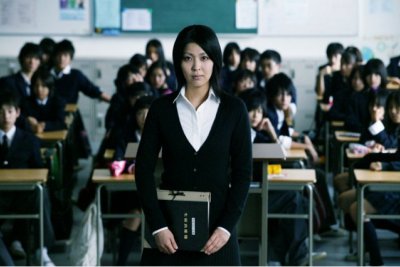Reviews - Confessions
Confessions
Reviewed By John Stakes

Confessions
The theme of revenge is the staple diet of many a film and, following “Louise-Michel” earlier in the season, we were treated last Sunday to a Japanese take on the subject with Tetsuya Nakashima’s 2011 Oscar shortlisted “Confessions”. The Japanese are noted for their inscrutability and their film industry can always be relied on to produce labyrinthine screenplays when the darker side of human nature is explored. “Confessions” is no exception.
Nakashima is well known in far eastern circles in particular for his “Kamikaze Girls” and “Memories of Matsuko” each of which was darkly lined, but here the darker side takes centre stage in a full bloodied tale of a terrible incident in the life of widowed mum and school-teacher Yuko Moriguchi, and its consequences. Her four years old daughter Manami is killed by two of Yuko’s teenage boy pupils whose identities are soon revealed as Shuya and Naoki. The police believe the girl’s death was accidental. Fortunately for the boys, even if guilty, as minors they are immune to any of the rigours of the law and would go unpunished. Yuko has tracked them down and now decides to teach them a lesson in life they will never forget.
Precisely how she goes about her task would fill the rest of this page if full exposition were given. Suffice it to say that Yuko is fiendishly clever. She may not be the world’s best teacher but she knows a thing or two about human nature. In a skilfully constructed, cleverly edited and engrossing half-hour opening sequence she silences her unruly class by telling the two teenage killers that she’s infected their milk cartons with her dead husband’s HIV infected blood. The cat now set firmly amongst the pigeons Yuko resigns, sits back and watches the bloody aftermath which is delivered in a series of first-person narratives and well-woven flashbacks.
A new enthusiastic teacher is appointed. Shuya continues at school and prospers but Naoki develops psychiatric problems. It turns out that Shuya planned to murder by electrocution but Naoki completed the dirty deed by drowning Yuko’s daughter in a misplaced attempt to gain street credibility and validate himself in Shuya’s eyes. Both boys come from disturbed home backgrounds which have left them chronically unloved and insecure. When Naoki’s mother realises she has bred a monster she tries to kill Noaki but fails and Naoki commits matricide. The carnage does not stop there.
Shuya moves on to befriend classmate Mizuki when Mizuki is forced to kiss him by class bullies. Mizuki discovers that Yuko did not infect the milk and develops feelings for Shuya. However she learns Shuya has an Oedipus complex and confronts him for not facing up to his mother. Shuya kills Mizuki in a fit of rage but the twisting plot is yet far from over!
Shuya plants a bomb to detonate on graduation day paradoxically to draw his mother’s attention to him through martyrdom whilst at the same time selfishly killing all his classmates. The plan backfires after he has blogged his plan which leads to Yuko telling him she’d found and moved the bomb into his mother’s office. Shuya is left distraught knowing that he’d set off the bomb using his mobile but killed his mother instead. Yuko tells Shuya his redemption can now begin but then, in a final flourish, says she was only kidding (a response to Shuya having told her that he’d killed her daughter).
Nakashima’s film was no examination of Japanese youth culture as trailered. It had no social redeeming qualities because Nakashima’s agenda was simply to create a piece of deliciously black, plot-driven hokum in which he succeeded brilliantly. Plot construction was inventive. The cinematography was stunning. His stylistic flourishes (particularly the tracking overhead shots) were seductive and his roaming camera underlined both his control and manipulation of the audience. Consequently the film refreshingly lacked the pretention we saw in “In A Better World” and, in its construction, reminded this reviewer more of that other oedipal twisting murder mystery, the 2010 Korean film “Mother”.
The “idiots” as Shuya described his classmates, were honed to beastly perfection. It is somewhat ironic that with the film’s 15 certificate most of the cast would not be allowed admission to the cinema to view their talent.
Nakashima is but 52 years old and with this his eighth film has now gained world –wide and not merely eastern art-house recognition. There is clearly more from his stable to come, and, although his cunning opus divided the Keswick audience, this reviewer hugely enjoyed Nakashima’s take on this ageless theme and directorial panache.
Nakashima is well known in far eastern circles in particular for his “Kamikaze Girls” and “Memories of Matsuko” each of which was darkly lined, but here the darker side takes centre stage in a full bloodied tale of a terrible incident in the life of widowed mum and school-teacher Yuko Moriguchi, and its consequences. Her four years old daughter Manami is killed by two of Yuko’s teenage boy pupils whose identities are soon revealed as Shuya and Naoki. The police believe the girl’s death was accidental. Fortunately for the boys, even if guilty, as minors they are immune to any of the rigours of the law and would go unpunished. Yuko has tracked them down and now decides to teach them a lesson in life they will never forget.
Precisely how she goes about her task would fill the rest of this page if full exposition were given. Suffice it to say that Yuko is fiendishly clever. She may not be the world’s best teacher but she knows a thing or two about human nature. In a skilfully constructed, cleverly edited and engrossing half-hour opening sequence she silences her unruly class by telling the two teenage killers that she’s infected their milk cartons with her dead husband’s HIV infected blood. The cat now set firmly amongst the pigeons Yuko resigns, sits back and watches the bloody aftermath which is delivered in a series of first-person narratives and well-woven flashbacks.
A new enthusiastic teacher is appointed. Shuya continues at school and prospers but Naoki develops psychiatric problems. It turns out that Shuya planned to murder by electrocution but Naoki completed the dirty deed by drowning Yuko’s daughter in a misplaced attempt to gain street credibility and validate himself in Shuya’s eyes. Both boys come from disturbed home backgrounds which have left them chronically unloved and insecure. When Naoki’s mother realises she has bred a monster she tries to kill Noaki but fails and Naoki commits matricide. The carnage does not stop there.
Shuya moves on to befriend classmate Mizuki when Mizuki is forced to kiss him by class bullies. Mizuki discovers that Yuko did not infect the milk and develops feelings for Shuya. However she learns Shuya has an Oedipus complex and confronts him for not facing up to his mother. Shuya kills Mizuki in a fit of rage but the twisting plot is yet far from over!
Shuya plants a bomb to detonate on graduation day paradoxically to draw his mother’s attention to him through martyrdom whilst at the same time selfishly killing all his classmates. The plan backfires after he has blogged his plan which leads to Yuko telling him she’d found and moved the bomb into his mother’s office. Shuya is left distraught knowing that he’d set off the bomb using his mobile but killed his mother instead. Yuko tells Shuya his redemption can now begin but then, in a final flourish, says she was only kidding (a response to Shuya having told her that he’d killed her daughter).
Nakashima’s film was no examination of Japanese youth culture as trailered. It had no social redeeming qualities because Nakashima’s agenda was simply to create a piece of deliciously black, plot-driven hokum in which he succeeded brilliantly. Plot construction was inventive. The cinematography was stunning. His stylistic flourishes (particularly the tracking overhead shots) were seductive and his roaming camera underlined both his control and manipulation of the audience. Consequently the film refreshingly lacked the pretention we saw in “In A Better World” and, in its construction, reminded this reviewer more of that other oedipal twisting murder mystery, the 2010 Korean film “Mother”.
The “idiots” as Shuya described his classmates, were honed to beastly perfection. It is somewhat ironic that with the film’s 15 certificate most of the cast would not be allowed admission to the cinema to view their talent.
Nakashima is but 52 years old and with this his eighth film has now gained world –wide and not merely eastern art-house recognition. There is clearly more from his stable to come, and, although his cunning opus divided the Keswick audience, this reviewer hugely enjoyed Nakashima’s take on this ageless theme and directorial panache.
Find A Film
Search over 1500 films in the Keswick Film Club archive.
Friends
KFC is friends with Caldbeck Area Film Society and Brampton Film Club and members share benefits across all organisations
Awards
Keswick Film Club won the Best New Film Society at the British Federation Of Film Societies awards in 2000.
Since then, the club has won Film Society Of The Year and awards for Best Programme four times and Best Website twice.
We have also received numerous Distinctions and Commendations in categories including marketing, programming and website.
 Talking Pictures
The KFC Newsletter
Talking Pictures
The KFC Newsletter
Links Explore the internet with Keswick Film Club


